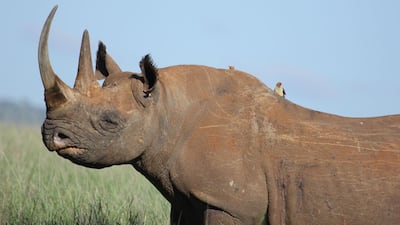Police investigations into the $72 billion-a-year trade in animal parts rarely snag the key players behind multinational operations, according to a new study based on interviews with dozens of convicted smugglers.
Researchers spoke to 73 people convicted of wildlife crimes in South Africa over a decade from 2009 and discovered that most were minor players within sophisticated organisations responsible for poaching, processing and moving animal parts.
Nearly three quarters of them were jailed for rhino-related crimes while the rest were in prison for trafficking abalone and cycads, one of the world’s oldest and most rare plant species, said wildlife trade monitoring group Traffic.
Some of those employed to dig up cycad plants – which are prized by collectors – were not told what they were doing and did not know it was illegal, the report found. Poachers were often from communities with few other employment options.
"The study found that most offenders either participated in the initial activity of the illicit wildlife chain – the poaching of the wildlife – or participated in supporting roles such as the transport or the storage," said the Insights from the Incarcerated report.
“These roles often carry the highest risk of detection by law enforcement, whereas their subsequent arrest and prosecution does little to disrupt the overall illicit trade in these commodities.
“Senior members... knowingly allow these people to take the most risk for the illicit enterprise, safe in the knowledge that if they are arrested, they are easy to replace.”
Researchers said the arrest of the “ground level” offenders could snare some of the masterminds through tracking phone data, pursuing money trails and anti-corruption tactics to target officials who are paid to ignore the trade.
South Africa is a key player in efforts to tackle rhino smuggling because it is home to more than two thirds of the world population.
The international trade in rhino horn has been banned since 1977, but poaching has surged over the past decade through demand for traditional cures in China and the Far East, despite the debunking of their supposed medicinal benefits.
The National reported in October how elephant poaching for valuable tusks was a source of income for ISIS in central Africa.
Voices: How A Great Singer Can Change Your Life
Nick Coleman
Jonathan Cape
Three ways to limit your social media use
Clinical psychologist, Dr Saliha Afridi at The Lighthouse Arabia suggests three easy things you can do every day to cut back on the time you spend online.
1. Put the social media app in a folder on the second or third screen of your phone so it has to remain a conscious decision to open, rather than something your fingers gravitate towards without consideration.
2. Schedule a time to use social media instead of consistently throughout the day. I recommend setting aside certain times of the day or week when you upload pictures or share information.
3. Take a mental snapshot rather than a photo on your phone. Instead of sharing it with your social world, try to absorb the moment, connect with your feeling, experience the moment with all five of your senses. You will have a memory of that moment more vividly and for far longer than if you take a picture of it.
Killing of Qassem Suleimani
White hydrogen: Naturally occurring hydrogen
Chromite: Hard, metallic mineral containing iron oxide and chromium oxide
Ultramafic rocks: Dark-coloured rocks rich in magnesium or iron with very low silica content
Ophiolite: A section of the earth’s crust, which is oceanic in nature that has since been uplifted and exposed on land
Olivine: A commonly occurring magnesium iron silicate mineral that derives its name for its olive-green yellow-green colour
The specs
Engine: 3.8-litre twin-turbo flat-six
Power: 650hp at 6,750rpm
Torque: 800Nm from 2,500-4,000rpm
Transmission: 8-speed dual-clutch auto
Fuel consumption: 11.12L/100km
Price: From Dh796,600
On sale: now
The 10 Questions
- Is there a God?
- How did it all begin?
- What is inside a black hole?
- Can we predict the future?
- Is time travel possible?
- Will we survive on Earth?
- Is there other intelligent life in the universe?
- Should we colonise space?
- Will artificial intelligence outsmart us?
- How do we shape the future?
What is type-1 diabetes
Type 1 diabetes is a genetic and unavoidable condition, rather than the lifestyle-related type 2 diabetes.
It occurs mostly in people under 40 and a result of the pancreas failing to produce enough insulin to regulate blood sugars.
Too much or too little blood sugar can result in an attack where sufferers lose consciousness in serious cases.
Being overweight or obese increases the chances of developing the more common type 2 diabetes.
New UK refugee system
- A new “core protection” for refugees moving from permanent to a more basic, temporary protection
- Shortened leave to remain - refugees will receive 30 months instead of five years
- A longer path to settlement with no indefinite settled status until a refugee has spent 20 years in Britain
- To encourage refugees to integrate the government will encourage them to out of the core protection route wherever possible.
- Under core protection there will be no automatic right to family reunion
- Refugees will have a reduced right to public funds
The National's picks
4.35pm: Tilal Al Khalediah
5.10pm: Continous
5.45pm: Raging Torrent
6.20pm: West Acre
7pm: Flood Zone
7.40pm: Straight No Chaser
8.15pm: Romantic Warrior
8.50pm: Calandogan
9.30pm: Forever Young


